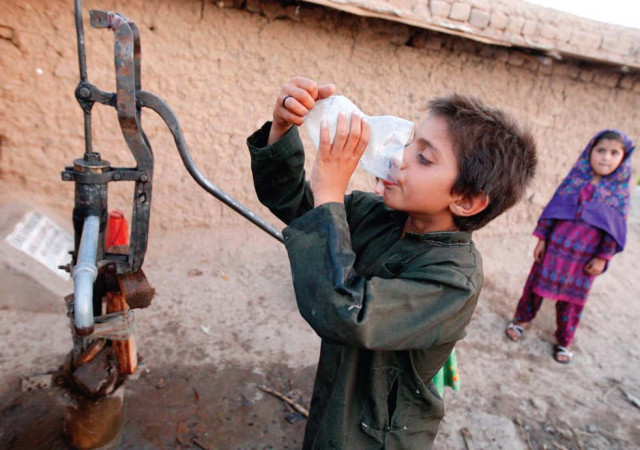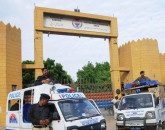Water is a new battleground
Peshawar is likely to depend on rivers for a consistent source of water supply.

Water is a new battleground
As a frontline state in the war against terrorism, water scarcity clearly is a low priority issue for the government. But it consistently fails to realise that ignoring the crisis could have serious ramifications for regional stability resulting in a war that could be deadlier than the one it is currently engaged in.
Experts have long argued that the government’s ability to provide and manage access to water is critical for ensuring political, fiscal and social stability. Despite this, the issue of water scarcity across provinces is often overlooked and underfunded.
Peshawar is no exception where water supply is vastly inadequate, leaving residents dependent on rivers as their wells have dried up. Officials state that residents’ consistent dependency on wells is draining the underground aquifer.
Some activists explain that because water is pumped on a regular basis for drinking purposes, the water table is fast receding. Although the city has no system in place to monitor the underground water table, it is estimated the levels have fallen as much as 130 feet in the past decade. This has created a vacuum underground resulting in saline water intrusion.
“This is extremely worrisome for a population entirely dependent on tube-wells for their water needs,” say officials at the Public Health Engineering Directorate. Peshawar is house to some three million people, who, officials fear, may have no choice but to turn to rivers to fulfill their needs.
Meanwhile, the current Pishtakhara water supply scheme which came into effect during the British rule, only serves a tiny segment of the Peshawar Cantonment.
To counter the menace, authorities are planning a Peshawar Greater Water Supply Scheme, which will allow approximately 200 million gallons per day (MGD) to be pumped in from rivers to meet the growing water requirements of the provincial capital. “Feasibility studies of this scheme are currently underway by NESPAK,” informed an official.
The official, on condition of anonymity, told The Express Tribune that the provincial water requirement stands at 69 MGD and they are facing a shortage of around 25 MGD.
But the government is faced with a dilemma. The plan was to pump about 20 MGD from Bara dam, 20 MGD from Jabba dam and 162 MGD from Kabul River at the Warsak dam, however, the Bara and Jabba dams are yet to be constructed, revealed the official.
Once built, both the dams would be situated in Khyber Agency, whereas, Warsak dam is located in the north of the city, close to the Mohmand Agency border.
Until then, tube-wells are the only viable source of water. According to official estimates, over 500 tube-wells are currently in use in Peshawar in order to pump ground water. Of this, only one in 13 tube-wells pumps safe water. A 2004-05 report by Pakistan Council for Research in Water Resources, which is the most recent, states that samples collected from 13 locations including the main water supply sources in Peshawar show that only one out of 13 tube-wells pumped safe drinking water.
It further says that 77 per cent of the samples were found to be microbiologically contaminated with Coliforms and 69 per cent were polluted with Escherichia coli or E coli, while 54 per cent were found unsafe because of a high level of calcium, whereas 8 per cent of the samples were declared unfit due to a high presence total dissolved solids.
Drinking from the river
There are others who argue that switching to river water would be safe for drinking purposes and there is nothing to fuss about. “Keeping in mind that cities such as Karachi, Hyderabad, Islamabad and Rawalpindi rely on similar means to fulfill their water consumption needs and have no complaints whatsoever, it should not matter if Peshawar follows suit,” comments an official.
But Jehangir Shah, a senior scientific officer at the Pakistan Council for Scientific and Industrial Research (PCSIR) informed The Express Tribune that the river water level in Hayatabad and various areas of Peshawar is on a constant decline.
Although the water level on Charsadda Road and Grand Trunk Road is rising, it is not fit for drinking, he declares.
In Shah’s opinion, authorities should simply focus on utilising surface water to meet the population’s drinking requirements. “Proper utilisation of water resources,” he adds, and “raising some much-needed awareness among people about the efficient use of these resources is also essential to tackle the water scarcity problem.”
EDITED BY SAARYSH ZUBERI AND AROOSA MASROOR design: samad siddiqui
Water dependent industries
In Peshawar, water-dependent industries are partly responsible for the crisis. These industries include paper mills, ghee and oil industries, steel re-rolling and marble factories and automobile service stations, says the PCSIR scientific officer. The water consumption rate of each unit at the above mentioned industries is often exceeds thousands of cusecs, he added.
The paper industry, for instance, uses a huge amount of water to make pulp with the help of digesters, while re-rolling mills require water to decrease the temperature. Similarly, ghee and oil industries use water for steam and cooling boilers, while the marble industry needs the natural resource for cutting and dyeing.
Shah further mentioned that automobile service stations use large amounts of water but their consumption is often overlooked. “Each service station uses at least 10,000 litres per day, and there are approximately 100 such stations currently operating in Peshawar,” he reveals.
Few years back, PCSIR had developed a technology which could recycle up to 80 per cent of used water at a cost of Rs50,000 per unit. However, authorities did now show any interest in funding and installing such units.
Published in The Express Tribune, September 16th, 2011.


















COMMENTS
Comments are moderated and generally will be posted if they are on-topic and not abusive.
For more information, please see our Comments FAQ